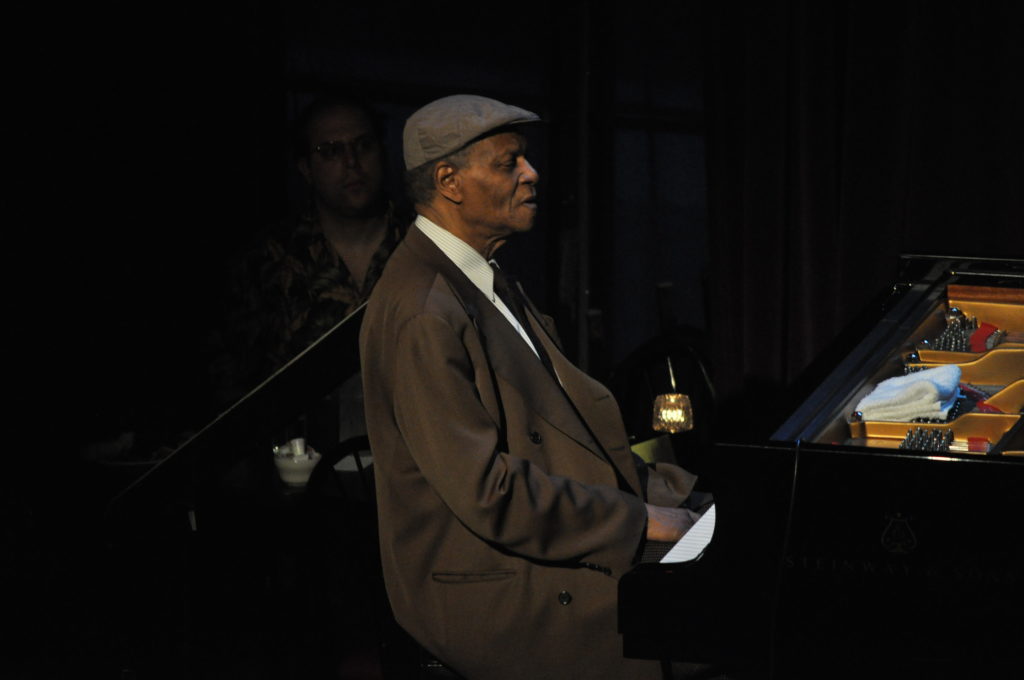There are many ways to understand the passage of time—it’s not just one thing after the next, the pinhead of the present gnarling the flesh of your foot as you try, impossibly, to balance upon it. Not just peering through the mist of memory. Not just cutting through the ice ahead. Time moves back and forth, slows down, speeds up, it eddies—it does a lot of eddying. It concentrates itself in one moment and becomes diffuse and vague in another. We’re always in the present, though we can never quite get there, nor can we leave. All of this is what the music of McCoy Tyner, who died on Friday at the age of eighty-one, teaches, though as soon as one tries to paraphrase music in anything other than other music, it’s robbed of some of its magic and much of its meaning.
Tyner was one of the defining musicians of the jazz period that began in the early sixties and which, I’d argue, we’re still in: pure art music that renews its inspiration in the the last hundred-plus years of pop music. As the pianist anchoring the classic John Coltrane quartet, Tyner’s instantly recognizable style—pendular, percussive, full of melodic flights and returns—created, hand in hand with drummer Elvin Jones, the landscapes across which Coltrane’s solos famously and fathomlessly ranged.
I’ve been gratefully lost for years somewhere between the interminable vamp of the 1961 studio recording of Coltrane’s rendition of “My Favorite Things” and the pounding sinews of Tyner’s 1976 solo track “Fly with the Wind.” The latter isn’t fusion, isn’t exactly jazz, but is all Tyner: intellect, melody, and abandon. Tyner’s art has guided my imagination, and now that he’s gone, and because the meaning of music is so slippery, I want to take a moment to say why.
I think I saw Tyner perform live twice: once at an outdoor concert at Lincoln Center, where he was a vigorously pulsing dot in the distance, and later at the Blue Note downtown, where he was only a few feet from me and I could stare, mesmerized, at his thundering left hand. He raised it high over the keyboard, above his head, before sending it hammering down, blasting open the time that followed, filling the bars with cascading showers of high notes. That, more than anything else, was the definitive Tyner gesture: opening the musical measure with that heavy left-hand chord, which was simultaneously a drum, a cymbal, and a signal to the rest of the music about where it should begin and end; more than any pianist save Cecil Taylor, Tyner understood his instrument as a series of pitched drums.
How, from that high distance, did his hand know where to find the chord he wanted when it slammed back down to the piano? But that is the least of his miracles. As Johnny Cash said, “Your style is a function of your limitations, more so than a function of your skills.” That’s a humbling truism about all creative work, but the limiting factors are different for each art form. Writers are stuck with a particular vocabulary, a language, and the deep memory of the kinds of sentences they heard growing up. A singer is stuck with the particular resonating chamber that is their body. Tyner was perhaps blessed by being stuck with those catapult hands and an unwavering conviction that rhythm and melody should tell a story, enact a high drama. It can be cheesy at times, but mostly I find I agree with—am glad to be a part of—the story his music tells.
It’s enough, more than enough, really, for an artist to simply find a voice, to chisel it out of the noise and to keep it ringing clear across a lifetime. Though he tried lots of modes and moods, Tyner began his professional career in the early sixties as a fully formed artist, and his last albums, from the aughts, are not unlike his first. From the beginning, his musical voice—seeking, earnest, exciting—was his alone. There was no one like him, except for almost every pianist after him. So many of the greats are leaving the earth in this dark time when we need them most. But his music is ever present, alive in so many fingers, awakening so many ears, swinging back and forth and thundering through time.
Craig Morgan Teicher is the digital director of The Paris Review and the author of several books, including The Trembling Answers: Poems and We Begin In Gladness: How Poets Progress.
from The Paris Review https://ift.tt/3aA7bYm

Comments
Post a Comment